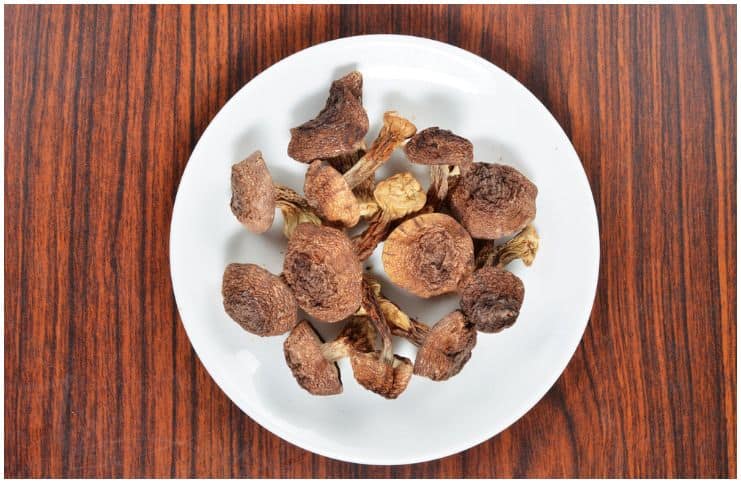Also known as God’s mushroom, the mushroom of the sun, almond mushroom or mushroom of life, it is an edible mushroom native to China, Brazil, and Taiwan.
It has found a friendly environment in Japan as well, where it is cultivated in special farms and transformed into a miracle supplement.
Due to its medicinal properties, it is also known as a medicinal mushroom, as it is used to treat cancer, diabetes, tumors, osteoporosis, and cholesterol, helping many patients overcome serious illnesses and gain their health.
For this reason, it is called God’s mushroom. Japanese doctors call it Kawariharatake.
Agaricus Blazei Murill (Agaricus subrufescens) – Composition, Uses, Health Benefits:
The mushroom has for 100 g: 359Kcal, 10.5 g protein, 0.5 g fat, and 68.1 g carbohydrates.
The therapeutic qualities of this fungus were revealed by two American researchers, after discovering a community of people in the Brazilian forests, where not only the average age exceeded 100 years, but those individuals were very healthy.
After analyzing their way of life, they found that their basic food consisted of Agaricus.
Laboratory tests have shown its extraordinary properties and thus began the expansion and acclimatization of the mushroom in controlled conditions. Numerous tests were also conducted by Japanese researchers, known for their thoroughness.
The results were spectacular – stopping the evolution of diseases in a proportion of 99.4% and a complete cure in 90% of the cases.
Due to its properties, it has proven to be effective in the following cases:
- Circulatory system: leukemia, malignant lymphoma, lymphoma caused by Hodgkin’s disease, heart disease, myocardial infarction, arteriosclerosis, angina pectoris, thrombosis, vasoconstrictive disease, hypertension, hypotension, etc.
- Digestive system: colon, rectal, intestinal, pancreatic, spleen, liver cancer. Hepatocarcinoma, hepatitis A, B, C, hepatomegaly, gastric cancer, gastric ulcer, chronic gastritis, duodenal ulcer, viral enteritis, chronic stomatitis, pyorrhea, constipation, loss of appetite, hemorrhoids, etc.
- Any type of diabetes, hyperlipidemia.
- Endocrine glands: hypercholesterolemia, hypo/hyperthyroidism, etc.
- Osteoporosis: it stimulates bone production by ergosterol, thus considered an excellent remedy.
- Neurological disorders: Japanese encephalitis, hemiplegia, Carpal Tunnel Syndrome (CTS), dermatomyositis, etc.
- Respiratory system: chronic bronchitis, asthma, lung cancer, pneumonia, etc.
- Female diseases: breast cancer, ovarian cancer, menstrual disorders, menopausal disorders, fibroids, polycystic ovaries, etc.
- Urinary system: cystitis, prostatomegaly, nephrosis (prostate disorders), kidney cancer, renal failure, etc.
- Red blood cell production: it stimulates the production of red blood cells due to its content of vitamin B12, folic acid, iron, copper, cobalt, and tryptophan.
- Cancer – the active compound found in this mushroom has strong cytotoxic effects on cancer cells, therefore, it can suppress neoangiogenesis and start apoptosis of neoplastic cells. Research has established that Agaricus may be especially beneficial in treating – prostate cancer, non-lymphocytic leukemia, and drug-resistant human hepatocellular carcinoma.
- Skin: eczema, atopic dermatitis, dermatomyositis, skin cancer, athlete’s foot, etc.
- Others: chronic rhinitis, Basedow disease, arthritis, flu, fatigue, lumbago, frozen shoulder, ophthalmopathy, blood purification, loss of vitality, HIV infection, rheumatism of various etiologies, etc.
At the HeLa test (stopping cell multiplication), which used a tissue affected by cervical cancer, a very small amount of steroids (10-30 ppm) stopped cancer cells from multiplying.
It also reduces the side effects of chemotherapy and radiotherapy, determining a considerable increase in the body’s immunity. These results are recorded by the Japanese Cancer Association and the Japanese Pharmaceutical Association.
Doses for tincture and capsules are:
- For severe cases: tincture – 20 drops 3 times a day; capsules – 2 capsules 3 times a day.
- Less severe cases: tincture – 15 drops 3 times a day; capsules – 1 capsule 3 times a day.
- Preventative: tincture – 15 drops 2 times a day; capsules – 1 capsule 2 times a day.
External use
Agaricus tincture can be used with excellent results on any skin condition: wounds, burns, warts, cancerous moles, psoriasis, mycosis, capillary regeneration, herpes, shingles, acne, staph infections, and streptococcal skin infections.
Contraindications
This mushroom is contraindicated for use in patients suffering from autoimmune diseases, those who have undergone organ transplantation, and those who have allergies.
READ THIS NEXT:
Angelica Archangelica: Side Effects
Anise Seed (Pimpinella Anisum) – Side Effects
Polygala Amarella (Dwarf Milkwort) – Medicinal Uses
References https://www.ncbi.nlm.nih.gov/pmc/articles/PMC3168293/ https://www.hindawi.com/journals/ecam/2011/192381/
